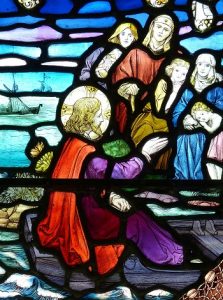The Beatitudes
The Beatitudes could be described today as Jesus’ manifesto on Christianity. They’re things we need to constantly be cycling through, ever growing in our faith. When we do that, each time through, we learn more, grow more, and become more Christ-like.
Blessed are those who are persecuted

Blessed are the peacemakers

Blessed are the peacemakers is a reflective Bible study. Here’s a brief overview:
Reflective Nature: The text provides a deep examination of the meaning behind the Beatitudes, particularly focusing on the concept of “peacemakers” as mentioned by Jesus in the Sermon on the Mount.
Personal Application: It encourages readers to consider how the term “peacemaker” applies to their lives and contrasts it with common worldly associations like weapons or symbols of power.
Biblical Analysis: The study delves into the original Greek words used in the Bible to gain a clearer understanding of Jesus’ teachings.
Spiritual Insight: It offers insights into the spiritual wisdom that comes from God, which is pure, peace-loving, considerate, and sincere, aligning with the characteristics of a true peacemaker.
Will God punish us today, like when He didn’t allow Moses to enter the Promised Land?

Will God punish us today, like when He didn’t allow Moses to enter the Promised Land? is a reflective Bible study. Here’s a brief overview:
Reflective Nature: The page delves into personal introspection and spiritual reflection, questioning how biblical events relate to personal faith and life today.
Moses’ Punishment: It explores the story of Moses not being allowed to enter the Promised Land, prompting readers to consider their own faith and obedience1.
Scriptural Analysis: The text examines specific passages from Numbers and Ephesians, encouraging readers to reflect on their trust in God and the consequences of their actions.
Life Application: It concludes with a discussion on how biblical lessons apply to modern life, emphasizing trust in God and the pursuit of a pure heart.
Blessed are the pure in heart

Blessed are the pure in heart is a reflective Bible study. Here are some key points:
Reflective Nature: The text delves into personal introspection and spiritual contemplation, particularly focusing on the meaning of “pure in heart” and its relevance in contemporary life.
Interpretative Analysis: It encourages readers to explore beyond the literal interpretation of biblical texts, suggesting that words like “pure,” “heart,” and “see” may have deeper meanings.
Personal Application: The author shares their journey of faith, including past struggles with understanding the nature of God as depicted in the Bible, which is a hallmark of reflective study.
Encouragement for Openness: The text invites readers to keep an open mind and seek the truth within the Bible, emphasizing the importance of personal discovery and spiritual growth.
Blessed are the merciful

Blessed are the merciful is a reflective Bible study. Here are the key points:
Reflective Nature: The article encourages readers to reflect on the meaning of mercy as described in the Beatitudes, particularly the phrase "Blessed are the merciful, for they will be shown mercy."12
Personal Application: It prompts personal contemplation on how to show mercy in one’s life, aligning with the reflective study approach.
Scriptural Analysis: The page delves into the Greek and Hebrew words for mercy, offering a deeper understanding of biblical texts.
Action-Oriented: It discusses the importance of action in demonstrating mercy, which is a characteristic of application study but is used here to enhance personal reflection.
Blessed are those who hunger and thirst for righteousness

Blessed are those who hunger and thirst for righteousness is a reflective Bible study, focusing on personal introspection and the implications of the Beatitudes, specifically the verse “Blessed are those who hunger and thirst for righteousness.” The author reflects on the deeper meaning of this verse, considering different interpretations and how it applies to one’s spiritual life. Here are the key aspects:
Personal Reflection: The author encourages readers to ponder what it means to truly hunger and thirst for righteousness beyond physical needs.
Interpretation Analysis: Various interpretations of the Beatitudes are discussed, including social justice and personal righteousness.
Spiritual Growth: Emphasis is placed on the growth that comes with an increasing role for the Holy Spirit in one’s life.
Righteousness Defined: The Greek word for righteousness, “δικαιοσύνη,” is explored to understand its broader implications beyond mere justice.
This study prompts readers to examine their own spiritual desires and the pursuit of a life that aligns with God’s will.
Blessed are the meek

Blessed are the meek is a Reflective Bible Study. Here’s a brief overview:
Reflective Nature: The article presents a personal reflection on the biblical verse Matthew 5:5, discussing the author’s thoughts and interpretations.
Personal Insights: It includes the author’s insights on the meaning of “meek” and how it relates to one’s relationship with God and others.
Cultural and Historical Context: The text examines the cultural and historical context of the term “meek” from Jesus’ time to present day.
Application to Life: While it does touch on application, the primary focus is on reflection and understanding rather than direct application or topical study.
Blessed are those who mourn

Blessed are those who mourn presents a reflective Bible study approach, focusing on deep contemplation and personal application of biblical principles. Here’s a brief summary:
Personal Reflection: The article encourages readers to reflect on their own spiritual state and the impact of sin on their lives and the world.
Biblical Analysis: It examines specific Bible passages, like the Beatitudes, to derive a deeper understanding of Jesus’ teachings.
Application to Life: The study applies the lessons learned from the scripture to one’s personal life, emphasizing the importance of mourning over sin and seeking comfort through the Holy Spirit.
Theological Insights: It offers theological insights into the nature of sin, death, and the promise of comfort and hope for believers.
Blessed are the poor in spirit

The content of the current page is reflective in nature. Here’s a brief overview:
Reflective Approach: Blessed are the poor in spirit engages in a reflective examination of the biblical verse “Blessed are the poor in spirit,” considering its meaning and implications.
Personal Insights: It explores personal insights into the teachings of Jesus, particularly focusing on the Beatitudes and their relevance to both historical and contemporary audiences.
Cultural Context: The text delves into the cultural context of Jesus’ time to understand the original message and its significance for the “ordinary” people of that era.
Spiritual Application: It also discusses the spiritual application of the Beatitudes in modern times, questioning the loss of impact and urging a return to the original messages of Jesus.
The page does not follow a strict inductive, topical, or application-based study format but rather invites readers to reflect on the deeper meanings behind the scriptures.
The Beatitudes – Introduction

The Beatitudes – Introduction is primarily a Topical Bible study, with some reflective elements and, of course, with an application approach to The Beatitudes.
Inductive Study: The page does not follow an inductive study approach, which typically involves observation, interpretation, and application directly from the text.
Topical Study: It appears to be a topical study, focusing on the theme of “The Beatitudes” from the Sermon on the Mount, examining the meaning and implications of these blessings.
Reflective Study: The content encourages reflection on the personal relevance of The Beatitudes, suggesting it includes elements of reflective study.
Application Study: While the page does not provide explicit application steps, it does discuss the relevance of The Beatitudes for modern-day disciples, hinting at application study aspects.
A note on happiness

A note on happiness is reflective in nature. Here are the key takeaways:
Reflective Nature: The author shares personal experiences and thoughts on happiness, depression, and the interpretation of Biblical passages, particularly the Beatitudes.
Personal Inquiry: The writer questions the concept of happiness, especially in the context of Christian beliefs and the teachings of Jesus.
Biblical Analysis: The text examines various Bible verses, including those from the Sermon on the Mount, to explore the deeper meanings behind the words of Jesus.
Dual Perspectives: It discusses the idea that Biblical passages can have different interpretations based on one’s emotional state, highlighting the contrast between happiness and depression.
